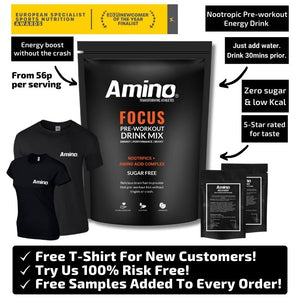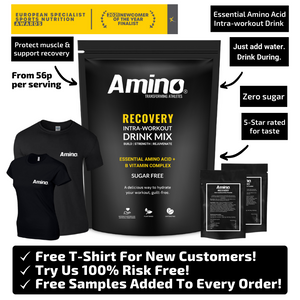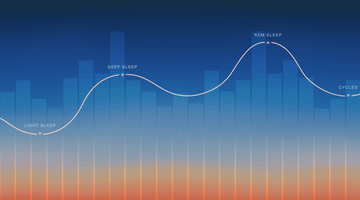
We all know the feeling... The day after a hard session, tasks like getting dressed, or bending down to pick something up off the floor feels worse than the workout itself. The official name for this is ‘delayed onset muscle soreness’ or DOMS.
This soreness is part of the muscle-building process and is inevitable after a long, hard workout. Exercise causes little micro-tears in your muscles, and the process of those fibres rebuilding provides muscle strength and mass i.e. the big gains you’re looking for.
By complementing your workout with the right diet and recovery regime, you can minimise the pain and get moving again the next day.
Here are the best and worst foods that go above and beyond to help fight muscle soreness.
Related: What causes post-exercise aches (DOMS)?
Foods that help sore muscles
Fill up on antioxidants
Eat foods that are high in antioxidants and anti-inflammatory properties. They can help reduce inflammation and lower levels of stress.
Leafy greens
Spinach, collard greens, kale, beet greens, dandelion greens and swiss chard are good choices. Spinach is packed with magnesium, which helps maintain normal muscle and nerve function, and has also been shown to help regulate blood sugar and blood pressure to boot.
Try: Make spinach the base of your salads, a side to your dinner, or toss a handful into your smoothie.
Tart cherries
Berries are high in antioxidants. However, cherries, in particular, are full of compounds known as anthocyanins. These compounds have been shown to relieve both muscle pain and weakness, inflammation, and cellular damage that occurs after hard exercise. Research on professional athletes has shown that Montmorency tart cherry juice can help improve recovery time and reduce muscle damage compared with other beverages. [2] Tart cherry juice delivers a much more concentrated form of compounds, resulting ina higher boost of antioxidants in less volume.
Try: Sipping on a spritzer of sparkling water, tart cherry juice and a wedge of lemon. Or, throw a little into your post-workout smoothie of chocolate protein powder, half-a-cup of cup cherry juice, frozen cherries and almond milk. A frozen banana is optional.
Cinnamon and ginger
A sprinkle of spice may help those muscles calm down. Although this doesn’t mean you eat a box of gingernut cookies post-workout.
In a 2013 study, a group of women given cinnamon or ginger described having significantly less muscle soreness after working out than those in the placebo group.
Ceylon cinnamon, in particular, has lots of potential health benefits.
Try: Add a generous sprinkle of spice to your morning oats, latte, toast, or sweet potatoes for a calorie-free flavour boost.
Turmeric
Turmeric’s active ingredient curcumin (the yellow pigment) has anti-inflammatory properties and the ability to increase the amount of antioxidants the body produces.
Early research has found that a curcumin supplement helped reduce the pain associated with delayed onset muscle soreness, reduced injury and improved recovery of muscle performance.
Try: Add a helping of turmeric to your eggs, smoothies or coffee.
Related: 5 Ways to Reduce Inflammation (and Become a Better Athlete)
Pack in (quality) protein i.e. EAAs (essential amino acids)
Cottage cheese
With around 23 grams of mighty protein per cup, there’s a reason that cottage cheese is the fitness community’s go-to post-workout snack. It provides two different types of protein, whey and casein. Whey protein is best known for its role in replenishing muscles quickly post-workout. Casein is a much slower-acting protein, making cottage cheese an ideal snack before you work out and for rejuvenating sore muscles as you sleep.
One study found that when athletes worked out in the evening and were given casein protein shortly before bed, they saw a spike in muscle synthesis when compared to a placebo.
Plus, cottage cheese contains an abundance of the essential amino acid leucine, which has been specifically found to speed recovery from pain.
Try: Enjoy it as a parfait with fruit and nuts, purée it into smoothies, or use it as a protein-rich base for pancakes or baked goods.
Eggs
Amino acids are the building blocks of protein, which, in turn, builds muscles, so it’s not surprising that research has found that consuming high-quality protein sources, like eggs, after an intensive exercise may help reduce the risk of muscle soreness while promoting muscle growth. With each 80-calorie egg, you get six grams of protein, made up of all the essential amino acids, including leucine, which is linked to muscle recovery.
Try: Hard boiling and peeling a batch of eggs as part of your weekly meal prep. Grab them for an easy post-workout snack or as part of a meal.
Wild salmon
Loaded with anti-inflammatory omega-3 fats, antioxidants and muscle-building protein, salmon is a close-to-perfect post-workout food. Omega-3s are specifically known for fighting inflammation, boosting blood flow to muscles during exercise, and, following exercise, decreasing muscle soreness and reducing swelling.
Try: Buy a double serving of salmon. Grill the fillets for dinner one night and eat one portion. Pile the leftovers on a leafy green salad with pistachios, berries and balsamic for lunch after a heavy morning session.
Related: EAA supplements - Do they actually work?
Get your caffeine fix
Coffee
Research suggests that a moderate dose of caffeine (about a cup or two of coffee) about an hour before working out can significantly reduce pain afterwards.
Try: Grab a low-fat americano or espresso on your way to the gym to really feel the benefits.
Don't forget carbohydrates
Watermelon
A juicy piece of watermelon is super-refreshing after a serious sweat session. But research on watermelon’s key amino acid, l-citrulline, suggests it might also soothe those sore muscles.
One study found that giving athletes watermelon juice — which contains the rind, the highest source of l-citrulline — after a workout helped reduce recovery heart rate and muscle soreness after 24 hours.
The natural sugars will also help drive protein into your muscles and replenish low glycogen stores, and the high water content is essential in preventing muscle-cramping dehydration.
Try: A little watermelon to your smoothie (include some of the rind for a boost of l-citrulline!), add it to a crunchy salad or infuse it in some water for refreshing post-workout hydration.
Bananas
Bananas are an easy-to-digest source of complex carbs that can help spike your insulin just enough to drive protein into your muscle and stimulate muscle rebuilding and growth.
They’re also a great source of the electrolyte potassium, which research suggests may help reduce muscle soreness post-gym.
Try: Pop one into a smoothie, slice it onto oats, or simply enjoy it straight out of the peel for a quick snack.
Foods to avoid when you have sore muscles
It probably won't be a surprise to know that these two foods fall under the “avoid” list for sore muscles.
Sugar
Since muscle pain is considered a form of inflammation, it makes sense to cut back on inflammatory foods on the days you work out — most notably refined carbs like sugar.
A 2017 study of more than 12,000 people found that those who consumed more added sugar (such as sugar found in soda or used in coffee or tea) had higher levels of inflammatory markers than people who consumed less sugar.
The good news is that natural forms of sugar in foods like fruits, milk, whole grains, and veggies don’t have the same effect.
Get your sweetness from whole foods when you can.
Alcohol
For obvious reasons, it might not be a great idea to plan a workout after too many tequila shots — but even a little booze can cause post-workout pain or up your risk of injury.
Alcohol dehydrates your cells, resulting in soreness, cramps, and potential strains. Research has also shown that it can interfere with blood flow and muscle recovery from injuries.
Related: How to Drink Alcohol When Training
Key Takeaways
If you’re busy building lean muscle and making gains, stock up on whole foods with the right nutrition to fuel your body and soothe aching muscles. Fruits, veggies, and proteins are solid choices for pre- and post-workout noshing. Incorporate them into your post-workout meals, either immediately after your session or at a meal later in the day. Recover faster so you can train harder. :-)
ENJOYED THIS ARTICLE?
Find out more about how amino acid supplements can help to support a healthy lifestyle, plus get 10% off your first Amino order.
References
[2] Kuehl, K. S., Perrier, E. T., Elliot, D. L., & Chesnutt, J. C. (2010). Efficacy of tart cherry juice in reducing muscle pain during running: a randomized controlled trial. Journal of the International Society of Sports Nutrition, 7, 17. https://doi.org/10.1186/1550-2783-7-17






